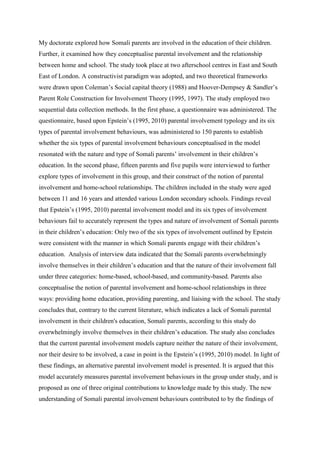
Doctoral Abstract
- 1. My doctorate explored how Somali parents are involved in the education of their children. Further, it examined how they conceptualise parental involvement and the relationship between home and school. The study took place at two afterschool centres in East and South East of London. A constructivist paradigm was adopted, and two theoretical frameworks were drawn upon Coleman’s Social capital theory (1988) and Hoover-Dempsey & Sandler’s Parent Role Construction for Involvement Theory (1995, 1997). The study employed two sequential data collection methods. In the first phase, a questionnaire was administered. The questionnaire, based upon Epstein’s (1995, 2010) parental involvement typology and its six types of parental involvement behaviours, was administered to 150 parents to establish whether the six types of parental involvement behaviours conceptualised in the model resonated with the nature and type of Somali parents’ involvement in their children’s education. In the second phase, fifteen parents and five pupils were interviewed to further explore types of involvement in this group, and their construct of the notion of parental involvement and home-school relationships. The children included in the study were aged between 11 and 16 years and attended various London secondary schools. Findings reveal that Epstein’s (1995, 2010) parental involvement model and its six types of involvement behaviours fail to accurately represent the types and nature of involvement of Somali parents in their children’s education: Only two of the six types of involvement outlined by Epstein were consistent with the manner in which Somali parents engage with their children’s education. Analysis of interview data indicated that the Somali parents overwhelmingly involve themselves in their children’s education and that the nature of their involvement fall under three categories: home-based, school-based, and community-based. Parents also conceptualise the notion of parental involvement and home-school relationships in three ways: providing home education, providing parenting, and liaising with the school. The study concludes that, contrary to the current literature, which indicates a lack of Somali parental involvement in their children's education, Somali parents, according to this study do overwhelmingly involve themselves in their children’s education. The study also concludes that the current parental involvement models capture neither the nature of their involvement, nor their desire to be involved, a case in point is the Epstein’s (1995, 2010) model. In light of these findings, an alternative parental involvement model is presented. It is argued that this model accurately measures parental involvement behaviours in the group under study, and is proposed as one of three original contributions to knowledge made by this study. The new understanding of Somali parental involvement behaviours contributed to by the findings of
- 2. this study may help schools and teachers devise effective parental involvement programmes to better engage with Somali families and their children.